Online Psychology Degrees

Get a Psychology Degree Online
Online Psychology degrees can lead to diverse, rewarding work while giving you insight into yourself and others that pays dividends throughout your life.

In a psychology degree program, you’ll come to essential truths about human behavior and nature while building skills that apply to business, therapy, education, sales, and all of your interactions in and outside of your work life.
In this guide we’ll look at the different online psychology degrees, get you started on where to find the right one for you, and discuss what you can do after earning one of these degrees. We’ll also look at what psychology degrees can teach you about human behavior, and how that can impact your own. Earning a psychology degree online comes with a number of advantages, and chief among them is the ability to begin this enriching experience immediately by exploring your options in the field as you scroll through this resource.
While you’re reading this, and/or searching for an online psychology degree, ask yourself:
 What are you looking to accomplish in your career, and how can a psychology degree facilitate these accomplishments? Undergraduate psychology degrees are a great jumping off point for careers in sales, human resources, management, and much more, while higher level psychology degrees can prepare you for specific roles within the field.
What are you looking to accomplish in your career, and how can a psychology degree facilitate these accomplishments? Undergraduate psychology degrees are a great jumping off point for careers in sales, human resources, management, and much more, while higher level psychology degrees can prepare you for specific roles within the field.- What is your previous educational and career experience, and what level of psychology degree are you qualified for or prepared to begin?
- How much can you spend on a Psychology degree? By taking an online psychology degree you can save a significant amount of money, but the tuition you’ll pay and the return on your investment in a degree will vary greatly depending on the school you select to attend.
- How much time can you commit to earning a Psychology degree on a daily, weekly, and overall basis?
- What’s the best way for you to attend a psychology degree program? You’ll find many options that are primarily online, fully online, traditional on-campus programs, a hybrid of the two, as well as programs that give you significant control over scheduling and receiving your degree.
- What would you like to specialize in, and what concentrations or focuses do specific online or on campus Psychology degree programs offer that can help you reach these goals?
Answers To Your Online Degree Questions
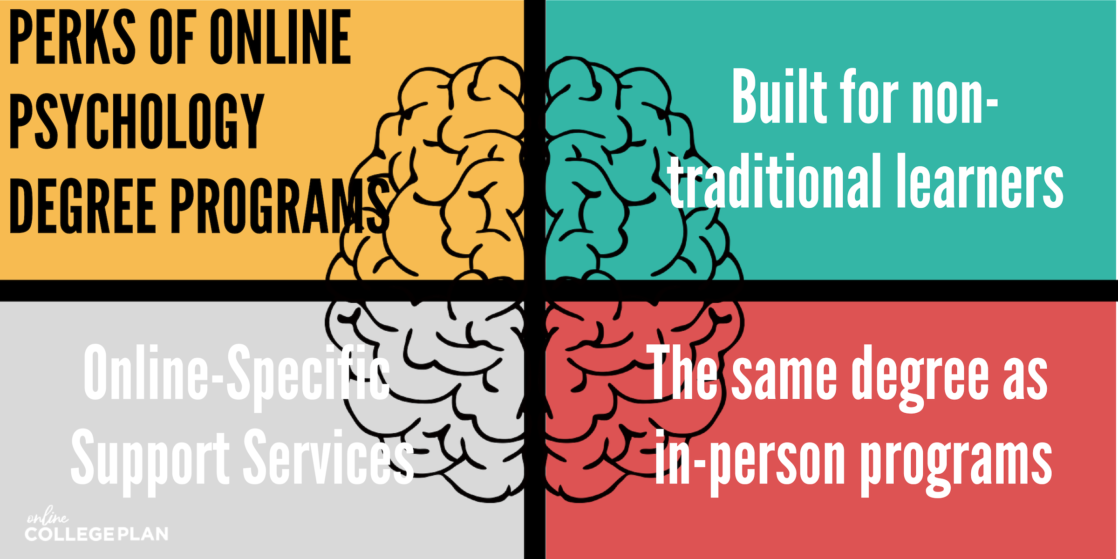
Here at Online College Plan, we’re constantly working to make your search for a degree easier, and to give you the information you need to make the best decisions about going to school. We want you to find a school that you can get into and afford, and one that is formatted in a way that you can thrive in. Finding a Psychology degree can be overwhelming, but by whittling away at the available options and answering specific questions you can build a profile of the kind of school and program you’re looking for. We’ve answered a multitude of common questions about Psychology degrees, online degrees, and much more related to modern education.
Here are some of the questions we’ve answered that specifically pertain to Psychology degrees:
- PsyD vs PhD: What Is The Difference?
- Where Can I Find A Program For An Online PhD in Psychology?
- Can I Earn A Doctorate Degree In Psychology Part-Time?
- How Long Does It Take To Get A PhD in Psychology?
- How Is A PhD in Psychology Better Than A Masters Degree?

Many of the questions we’ve answered address finding and earning a degree online, and grapple with the different formats, timetables and logistical issues that impact earning a degree, including going back to school at different stages of your life, or working while going back to school. This will also help you narrow down your options in psychology and elsewhere. Here’s a look at some of those FAQs:
- Which Colleges Or Universities Offer The Best Online Masters Programs?
- How Can I Find The Best Online Degrees?
- What Is A Professional Degree?
- Can I Earn A Degree Online And Still Have Time To Work?
- Where Can I Find The Best Online Degree Programs As A Working Professional?
For a complete look at all of the FAQs we’ve answered (which cover innumerable degree options and delivery formats, along with general information about choosing and completing higher education programs online), check out our complete FAQ section here.
What Can You Do With Your Online Psychology Degree?
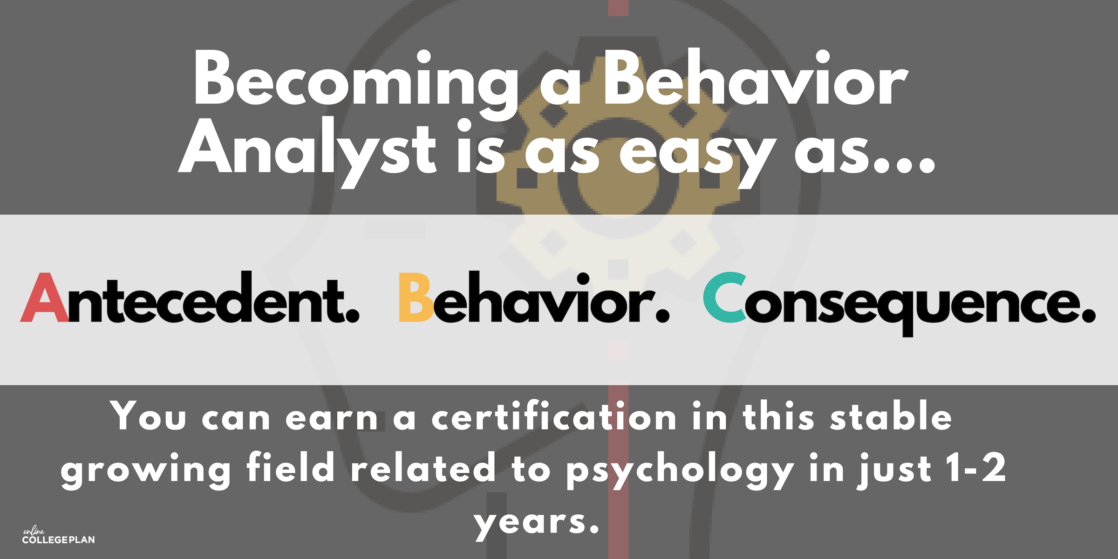
First off, what you can do with a psychology degree depends on which degree you get. An undergraduate degree in Psychology (Bachelors or Associates) will largely overlap with a general Humanities or Liberal Arts education in adjacent majors like English, Communications or Journalism, with some classes that specifically deal with Psychology. In order to start working as a therapist, you’ll need to earn a higher level degree, either a Master’s or Doctorate. Once you’ve earned a Masters, Ph.D. or Doctorate in Psychology, you’ll be ready to fill one of the myriad niche positions in the field, or put your skills to work in a number of different industries. However, if you get a graduate degree in psychology you’ll likely want to work in the field, so let’s inspect some of the positions you could end up in:
- Clinical Psychology: This is what people often think of when they picture a job in psychology. In these roles you’ll diagnose and care for people with mental health problems, whether they be temporary problems or long-term conditions.
- Cognitive Psychologists: In these jobs psychologists examine the ways people view, comprehend and interact with the world around them, the ways people view their experiences, and how that colors their perspective. Cognitive researchers try to find and test treatments for people with mental disorders, and clinicians support them directly.
- Community psychologists: Here you’ll help different populations that are facing overarching problems like disease or crime epidemics on how these issues are mentally impacting those affected by them.
- Counseling psychologists: Similar to clinical psychology but with more of an emphasis on coping with difficult situations and guiding people towards overcoming them to achieve their goals.
- Developmental psychologists: In these roles you’ll work to master how people’s minds change over the course of their lives, clinically specialize in working with people in different stages of their lives, and do research related to aging.
 Educational psychologists: Here you’ll often work within an educational institution, and focus on how teaching and learning can be done improved to better student outcomes.
Educational psychologists: Here you’ll often work within an educational institution, and focus on how teaching and learning can be done improved to better student outcomes.- Engineering psychologists: Work to create machines that are intuitive and improve people’s lives. Often called “human factors specialists” or “human factors psychologists,” these experts help design machines that are easy for people to use.
- Environmental psychologists: You’ll deal with how different environments change how people think, feel and behave, and what can be introduced into those environments to impact them positively.
- Evolutionary psychologists: Here you’ll inspect the ways natural selection molds brains and alters the way people think.
- Experimental psychologists: Research, design, implement and analyze experiments on humans and animals to answer important psychological and scientific questions.
- Forensic psychologists: Here you’ll look at how patterns of behavior and mental states impact legal issues, decide whether people are mentally fit to stand trial, and potentially help police solve crimes by profiling suspects.
- Health psychologists: You’ll help people with bad habits that are hurting their health to improve their lives.
- Organizational psychologists: Here you’ll look at the way psychology influences businesses and organizations while using your training to increase productivity.
- Neuropsychologists: In these roles you’ll focus on how the nervous system and brain alters thoughts, feelings and behavior, operating more from a medical perspective than a therapeutic one.
- Quantitative Psychologists: You’ll use math to measure and interpret data from experiments, assessments and research, while building models that aid you and other psychologists in data analysis.
- Rehabilitation psychologists: Here you’ll work to counsel and treat people with significant physical injuries or disabilities.
 School psychologists: These psychologists work in schools to take care of students and their families who often have care providers offer psychological support to students and their families.
School psychologists: These psychologists work in schools to take care of students and their families who often have care providers offer psychological support to students and their families.- Social psychologists: You’ll use your training to examine how society alters the way humans think and behave, and study relationships between individuals and within groups.
- Sports psychologists: Here you’ll work to bolster athlete motivation and resilience while combating doubt and trauma that can negatively affect their performance.
These are just some of the roles a graduate or doctoral degree in Psychology will prepare you for. Regardless of where you end up working, a degree in psychology will build skills that help you throughout your life. Let’s take a look at some of the main benefits to earning a psychology degree:
An Online Psychology Degree Will Change Your Career and Life By Giving You Greater Skills in:
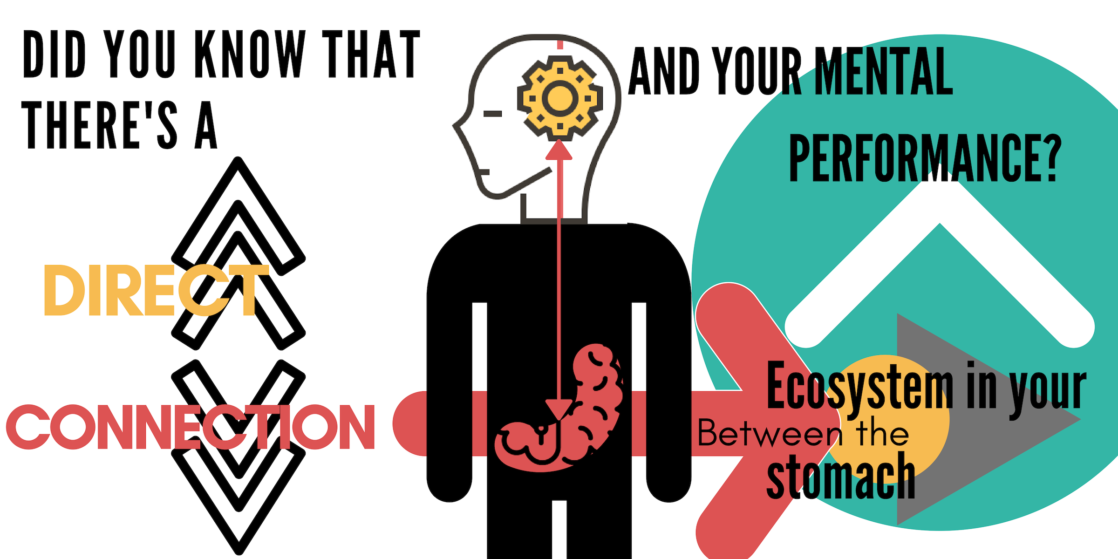
- Communication: Psychology degrees teach you how to listen attentively, and how empathy, friendliness and nonverbal communication can help promote greater understanding between you and the people you interact with throughout your life. They also teach you hard skills in academic writing and presentation.
- Research: In these programs you’ll learn how to conduct quantitative and qualitative experiments, dissect data, read scholarly, theoretical, practical therapeutic writing and first-person accounts, as well as present the fruits of your findings in succinct, coherent ways.
- Assessment: You’ll learn how to use tests and discussion to hypothesize about a person’s difficulties and capabilities,
- Problem-Solving: You’ll learn how to help people in a variety of ways, including helping them identify issues, discover the behavioral and environmental root causes for them through analysis, and coming up with tangible solutions or strategies they can take to mitigate or eliminate them.
- Recognizing Limitations: These programs will help you realize you can’t do everything for everyone, or yourself, and give you realistic expectations for how you CAN help people while maintaining perspective about your and their capabilities. You’ll also learn how to partner more traditional medicinal approaches and tests with psychological therapy and other remedies.
- Abstract Reasoning: Keeping an open mind is very important in Psychology degree programs, and so is using your analysis of information to come to conclusions on an intangible level. In psychology programs you’ll learn to theorize about patterns, relationships, and come up with suggestions and planning solutions based on your intuition and recorded information.
- Organization and Time Management: When you continuously study patterns of thinking and behavior and work to solve complex problems, you’ll learn the importance of how creating work environments and planning can increase motivation, and foster efficiency and productivity, letting you and those you work with achieve better results.
- Leadership and Cooperation: You’ll learn to work with others, surrender to what you don’t know and need to improve in, and take the lead where you excel or have more experience, while helping to divorce yourself and others from issues of ego that are counter-intuitive to achieving the best results possible.
- Meditative and Self-Control Techniques: Mindfulness is a big buzzword, but that’s because of the ocean of evidence suggesting it can lead to greater discipline, and longer, higher life quality. Mindfulness and meditation are becoming increasingly important in Psychology, especially in Cognitive Behavioral Therapy, which is playing a larger role in the field in comparison to schools of thought like Freudian analysis. Learning about meditation and practicing it professionally and personally is extremely helpful in all phases of your life.
How Much Money Can You Earn After Graduating From an Online Psychology Program? What Does the Psychology Job Market Look Like?
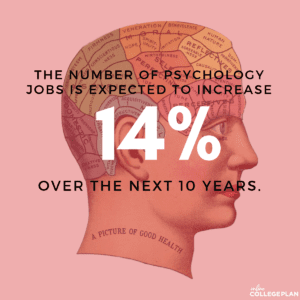
As we’ve discussed, there are so many diverse options for employment within Psychology, as well as jobs outside of the field you’ll likely qualify for with a graduate degree in Psychology. Apart from the degree you earn, where you live will be extremely influential on how much you earn (more on that later). However, there are some baseline expectations you can have about your earning potential in Psychology:
- The median pay for psychologists in America is $81,040 annually, or $38.96 per hour, according to the Bureau of Labor Statistics. Not bad for jobs that let you deeply improve people’s lives in a number of ways.
- There are 181,600 jobs in psychology.
- There is an expected 6% growth in psychologist jobs through 2031, which translates to 11,300 new jobs.
What Are the Different Psychology Degrees?
There are five major types of degrees in psychology. They are:
- Associate’s in Psychology: This is the first step you can take in your higher education in psychology. It can be finished in two years and is often used to transfer into Bachelor’s programs. There are very few jobs that these degrees qualify you for; however you can cut your teeth in psychology by working as a psychiatric technician at a state mental hospital, or work in rehab in some states.
- Bachelor’s in Psychology: Often you can choose between a Bachelor of Arts (more liberal arts courses) or a Bachelor of Science (more science courses). These programs can often be finished in four years. Many students who graduate with a Bachelor’s in psychology go on to work in a different field, but a Bachelor’s can prepare you to work as a case manager, technicians, counselors, and rehab specialist depending on your state’s requirements.
- Master’s in Psychology: These degrees generally require two to three years and can come in many specializations. Students choose between Master of Arts and Master of Science degrees, and are prepared to work in some of the different areas providing mental health services, or continue their education at the doctoral level.
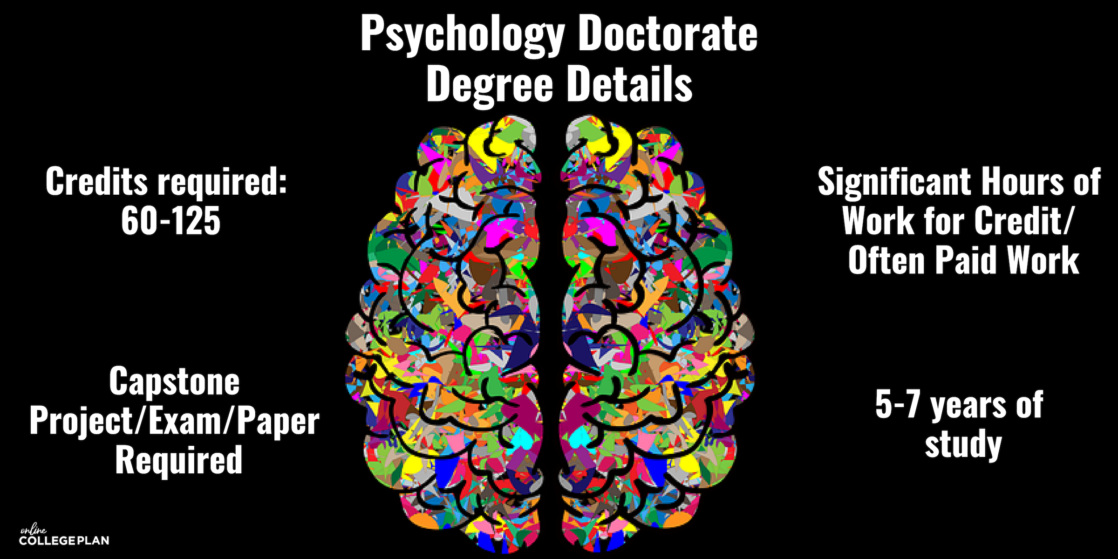
- Ph.D. in Psychology: These degrees take five to seven years to complete and can come in areas like clinical or counseling psychology, or for those interested in research or teaching, areas like social, developmental, industrial-organizational, or experimental psychology.
- Doctor of Psychology (Psy.D.):Here you’ll study and work for four to seven years to complete your degree. Compared to Ph.D’s, these degrees are more concentrated on professional practice and culminate in taking state and national licensing tests.
What Are Some of the Best Online Psychology Degrees Available?
Here at Online College Plan, we’ve done our best to give you detailed, useful rankings that will assist you in picking an online psychology degree that’s perfect for you. We’ve ranked schools on many criteria, and here are our best online psychology rankings:
- The Top 30 Online Psychology Programs
- Top 20 Online Colleges with the Best PhD in Psychology
- Top 20 Online Christian Counseling Degrees
- The 19 Best Online Masters in School Counseling Programs
What Are the Common Courses in a Psychology Curriculum?
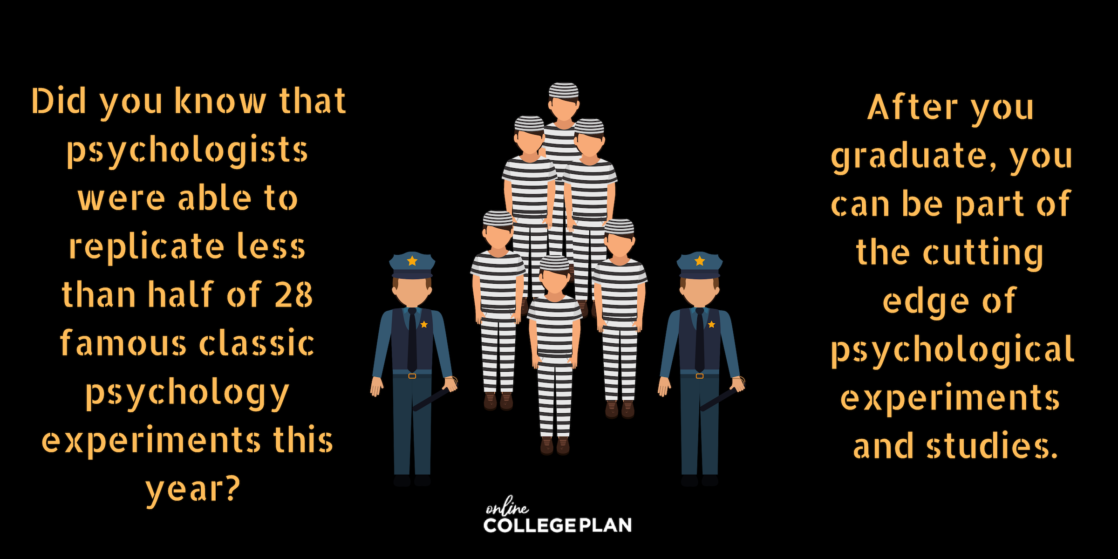
Every psychology program is different, but there are some core courses you can expect to take in any psychology program. Obviously, the degree level will also impact offerings, but here are some areas you’ll explore in a psychology program:
- Statistics: This course will give you the tools to analyze data and research, and will be used constantly throughout your career in psychology.
- Experimental Psychology: Here you’ll learn methods of research and design experiments.
- Physiological Psychology: To understand the mind you need to know about how it functions, including neural processes, sensation, perception, neuroanatomy, and more.
- Cognitive Psychology: This course covers all of the processes in the brain, including language, memory, problem-solving, learning, thinking, and much more.
- Developmental Psychology: Here you’ll learn about how biological, emotional and cognitive processes are impacted by environment, society, culture, family, and more.
- Abnormal Psychology: A must for anyone looking to work in mental health, addressing abnormal behavior, psychological disorders, and treatments that address them.
What Specializations are Available in Psychology Programs?
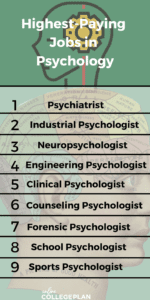
There are many specializations and concentrations in psychology programs, but here are five of the most common ones:
- School Psychology: In this concentration you’ll learn how to work with students, teachers, administrators, and parents to build policies and methods for fostering student success in a variety of educational settings.
- Forensic Psychology: Here you’ll learn to use psychology to work with perpetrators of crimes to understand their actions, work with law enforcement to catch criminals, help victims and their families, and work in courtrooms, lending your psychological expertise to influence trials.
- Social Psychology: In these specializations you’ll learn about how people mesh in group settings and delve into what factors control the ways people emote, think, process and interact with one another. You’ll be prepared to work for schools and organizations to create cohesiveness.
- Counseling Psychology: This is considered the best way to obtain professional licensure as a psychologist, letting you start your practice or work in many different settings or for a wide variety of organizations. You’ll learn to deal with patients, record their case histories, observe, interview and analyze them to help them comprehend and deal with their problems.
Where Are the Best Places to Live and Work After Earning a Psychology Degree?
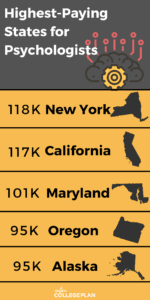
Now that we’ve explored so much about online psychology degrees, where you can find the right program for you, and different aspects of earning them plus learning outcomes, let’s look at some of the best places in America to ply your trade in psychology. According to U.S. News & World Report, the top five cities to work in Psychology and their salary outlooks are as follows:
- New York City – $143,920
- Los Angeles, California – $142,200
- Lake County, Illinois – $113,950
- Silver Spring, Maryland – $106,780
- Oakland, California – $100,490
While money is essential, it’s not the only metric to measure where you should work. According to Value Penguin, the best five cities for psychologists are the following. They factored in the number of jobs, the median salary, cost of living and location quotient. Their top five were:
- Hanford, California
- San Luis Obispo, California
- Vallejo, California
- Madera, California
- Worcester, Massachusetts
Value Penguin also ranked the best cities for psychologists on large (population over 500,000), medium (100,000 to 500,000) and small cities (under 100,000). Their top choices in each designation were Nassau, NY, Vallejo, California, and Hanford, California respectively.
How Do You Start Earning an Online Psychology Degree Today?

With this guide, you’ve taken a gigantic leap towards earning a psychology degree, either online or on-campus. The next steps are up to you, but chief among them are using this resource, and the resources we’ve linked to help locate specific programs that match your needs. Once you’ve done that, you can easily reach out to those programs to request more information about them and speak to student support professionals that will help you throughout your application process. Good luck and godspeed!

 Educational psychologists: Here you’ll often work within an educational institution, and focus on how teaching and learning can be done improved to better student outcomes.
Educational psychologists: Here you’ll often work within an educational institution, and focus on how teaching and learning can be done improved to better student outcomes. School psychologists: These psychologists work in schools to take care of students and their families who often have care providers offer psychological support to students and their families.
School psychologists: These psychologists work in schools to take care of students and their families who often have care providers offer psychological support to students and their families.